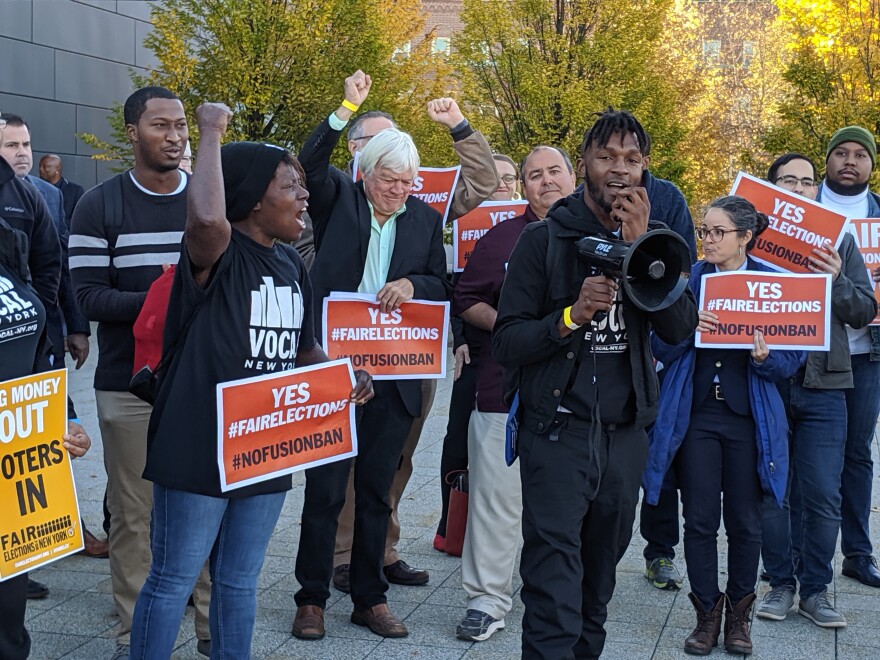Third parties used a public hearing in Buffalo Tuesday to voice concerns New York state’s commission to get big money out of politics is actually meant to get them out of the election system.
Minor parties, as well as election reform activists and Republican lawmakers, spoke out at Buffalo State College during the fourth and final public hearing for the Public Campaign Financing Commission.
The commission is shaping the state’s new public matching funds program, which would give up to $100 million a year in public financing to candidates who get small private donations, but is also considering election changes that minor parties say would make it even harder for them to compete.
“We think it’s just political hackery,” said Tom Roulley, chair of the Western New York chapter of the Working Families Party, a progressive third party that is an adversary of Gov. Andrew Cuomo's. “Right now in this great country we have a major problem with the president … doing things for political reasons and we’d hate to see the governor go down that same path.”
Third parties like the Working Families Party have accused Cuomo of creating the commission as a backdoor way of eliminating their influence.
They fear the commission will eliminate fusion voting, which allows candidates to run on multiple party lines. Cuomo appointed longtime fusion voting opponent and chairman of the state Democratic Party, Jay Jacobs, to the commission.
They’re also concerned the commission will raise the threshold of votes needed for third parties to get automatic ballot access. This comes after a New York Times reportTuesday that Jacobs is proposing raising the number of needed votes from 50,000 to 250,000.
“This is Cuomo’s attempt to legally rig elections, and he put the fox in charge of the henhouse,” said state GOP Chairman Nick Langworthy, referring to Jacobs.

During a break in the hearing, Jacobs called the accusations “ridiculous,” saying he just wants to ensure third parties are legitimate before they receive public dollars under the new system.
“The fact that you have a small group of people that want to have a voice, I have no debate with,” he said, “but should the candidate running on their ballot line have access to public funds? That, in my view, mandates a certain credibility.”
As for The New York Times report he’s trying to raise the vote threshold to 250,000, Jacobs said he’s not set on that number, but does want to see the threshold increase “dramatically.”
“We have 12.7 million registered voters (in New York state.) If you can’t get 200,000 of them to vote on your line, how credible really are you that you then deserve matching funds for a candidate who runs on that line?” he added.
Much of the discussion Tuesday centered on the debate over fusion voting, which is only permitted in New York and seven other states.
Rex Stewart, one of the plaintiffs in the Niagara County lawsuit trying to protect fusion voting, said he’s a registered Democrat who votes for Democratic candidates but on the Working Families Party line.
“I do this to send a signal to my party that it should continue to advocate for many of the progressive policies and legislation that the Working Families Party promotes,” he said.
Some spoke out against fusion voting, like Jeremy Zellner, who is both Erie County Board of Elections Democratic commissioner and Erie County Democratic Committee chairman.
Zellner said fusion voting is costly to taxpayers because it causes bigger ballots, as well as litigation over ballot access. Plus, he said it creates confusing ballots.
“New York state voters should not have to play a political game of ‘Where’s Waldo?’ when looking at a ballot,” he said.
Zellner also argued fusion voting takes actually takes away voter choice.
“Candidates should best seek the line that represents what they believe, not the line that merely gives them the best chance of winning,” he said.
Members of the Fair Elections for New York campaign, who held a small rally prior to the hearing, voiced concerns the commission’s focus on fusion voting is a distraction from establishing a strong public financing program.
“We are concerned the commission is heading in the wrong direction and is developing a weak public financing program focused more on protecting incumbents than amplifying the voices of small donors,” said Laura Friedenbach, deputy campaign manager for the Fair Elections for New York campaign.
The commission has until Dec. 1 to make its recommendations. Those recommendations will become law if the state Legislature does not hold an end-of-the-year session to reject them.



